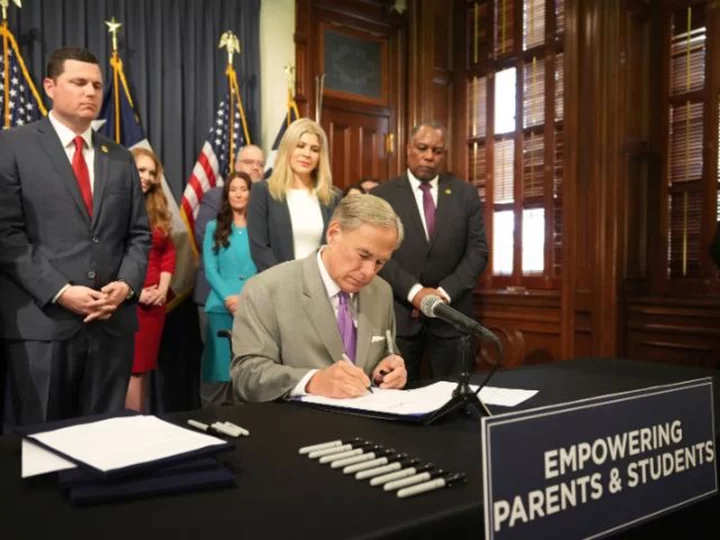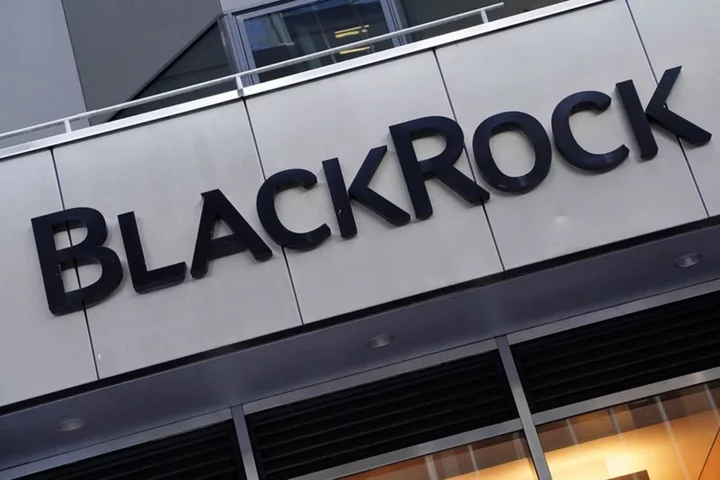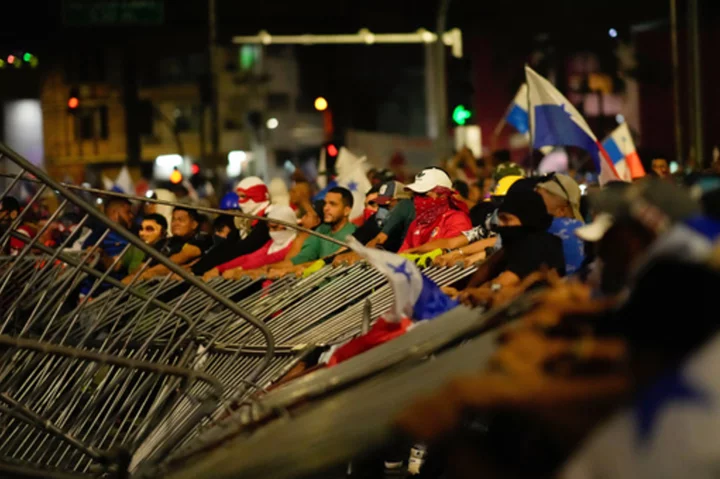The CEO of the largest independent bookstore in Texas oversees a four-story, 40,000-square-foot space in Austin and the 100 employees who staff it.
BookPeople CEO Charley Rejsek said she has time to read about 30 books a year — but doesn't have the time to read and rate the thousands of books she might sell to a school, nor does she have the money to pay someone else to.
But a new Texas law might require her to.
Book vendors selling to Texas public schools, ranging from national sellers like Amazon to local bookstores with eight employees, must now rate all the books they sell based on sexual content, according to new legislation signed into law on June 12.
If the book vendor fails to comply with state library standards that will be in place by January 1, 2024, they'd be barred from selling to Texas public schools.
"We're losing all school business forever. That's how it's going to hurt us," Rejsek said.
The law's primary author, Republican Texas State Rep. Jared Patterson, said its aim is simple: Get sexually explicit content out of schools.
But the burden of rating these books falls on book vendors. Vendors told CNN this makes complying impossible.
"We've never rated books ever," Rejsek said. "We have no training."
Patterson said he disagrees: Ultimately, it's the vendor's job to rate the books appropriately, he said.
"I don't care if you're a small business or a big business; If you're selling something that's going to be in the hands of children, you should know whether or not it's safe for that child to consume," Patterson said. "The book vendor is the one with the financial relationship with the school district and, so they're the ones that can most easily be held accountable for this."
What is the READER Act?
Under the 'Restricting Explicit and Adult-Designated Educational Resources' Act, or the READER Act, vendors that sell books to Texas public schools must assign every title that describes or portrays sexual conduct one of two labels: sexually explicit or sexually relevant.
The law defines sexually explicit books as those containing sexual content that is "patently offensive," explained in state law as anything that affronts "current community standards of decency." These books will be banned from school campuses.
The law says that sexually relevant books depict sexual conduct but not necessarily in a way that is "patently offensive." Students will need a parent's written consent to check one out.
Shirley Robinson is the executive director of the Texas Library Association, with more than 5,000 members across the state. She called the definitions "very vague."
"What might be sexually relevant to one vendor could be sexually explicit to another, and yet another vendor may not feel like the book needs to be rated in either of those categories," Robinson said.
Using the word "vendor" is "where this whole bill went wrong," said Ben Conn, President of the Educational Book and Media Association.
The following could all be considered vendors under the READER Act, according to Conn, as they all sell books: Amazon, Barnes & Noble, a publisher like Penguin Random House, a wholesaler like Conn's Classroom Library Company and an independent bookstore like BookPeople.
"They've encapsulated the whole entire industry," Conn said. "That would be like to say Paramount's going to come out with a movie and every individual movie theater could then go ahead and rate the movie differently. It just makes no sense whatsoever."
The 31 book wholesalers that Conn advises as president have brought in over $200 million in educational book sales to Texas over the past three years. Conn called the law "groundbreaking" in that the book industry wasn't considered "at all."
Patterson, the law's primary author, told CNN he views the issue as a matter of responsibility. "If you can't determine if what you're selling is going to be harmful to children or not, then maybe you shouldn't be selling into Texas school districts," he said.
But the question many vendors are grappling with is not if sexually explicit content should be in schools, but how to go about getting rid of it. This law, they say, is not the answer.
In a letter written to members of the Texas Senate Committee on Education in May, Conn agreed that inappropriate content has no place in children's hands. But he recommended the bill be amended to establish one rating entity, which would prevent conflicting ratings and take the liability off of vendors' shoulders.
The idea didn't gain traction.
Patterson said he believes "capitalism is the path forward here" and that financially, vendors "have an incentive to figure this out."
Robinson said she worries the unwanted responsibility could be a disincentive.
"This bill is going to put a tremendous burden on those vendors," Robinson said. "Some may make the decision to no longer sell to Texas schools, which is not good for business."
'Our margins are already so thin'
Texas is home to nearly 9,000 public schools and roughly 300 independent bookstores. Valerie Koehler, owner of Blue Willow Bookshop in Houston, estimates that about 25% of her business comes from partnering with 18 to 20 local schools.
Koehler said she doesn't read all the books that her store carries, especially because some purchase orders include books that she's never had in the bookstore before.
"It's very vague at best as to what we're supposed to be doing," Koehler said. "Certainly, we can't read everything."
Koehler worries that the law may take time away from her and her employees interacting with customers, whether that be a local teacher looking for a new addition to a classroom library or a "10-year-old kid who's excited about the next book in a series."
"To see them get excited about books, that's why we're doing this," Koehler said. "Not to rate books."
Richard Bailey, the school liaison for Interabang Books in Dallas, arranges author visits, book drives and book fairs for Dallas County schools.
He wrote a letter to Gov. Greg Abbott in May in protest of the READER Act, also known as HB 900. Bailey expressed concern that contested books could be removed from libraries and classrooms for an undetermined period of time while a review is underway.
"It is ridiculous to think that there is a cabal within the community of booksellers and educators who are hoping, who work under cover of darkness, to present sexually explicit material to young people," Bailey said. "That is absolutely wrong."
Interabang Books and Nowhere Bookshop in San Antonio both offer educator discounts to help support their community. At Nowhere Bookshop, educator discounts start at 20% but can go up to 40% if schools buy multiple copies of a book.
"Our margins are already so thin on these deals," Elizabeth Jordan, manager of Nowhere Bookshop, said. "If we add another layer of labor or another layer of some sort of vendor that has to do this reviewing for us, then it does not make financial sense for us to continue."
'Model legislation for the rest of the country'
Patterson told CNN this law is "model legislation for the rest of the country."
Jordan said it has the potential to harm children's education.
"I am tired of people saying 'parent choice' and not giving me a choice as a parent. You can't choose for all the students," Jordan, who is also a mother of two children in Texas public schools, said. "I am mostly concerned that my kids are not going to have the best, most diverse libraries available to them because of a very vocal minority of parents."
It is unclear in the law whether books containing innuendo or suggestive dialogue might fall under "sexually relevant," in which case even a high school student would need a parent's written permission to check them out.
Nor is it clear whether a book contested by a parent for an inaccurate rating will be removed from school libraries while the Texas Education Agency reviews its contents.
The law also applies retroactively to books sold to schools in the past, meaning that vendors must issue recalls for "sexually explicit" books still in circulation. But booksellers often lack the knowledge of what books are still in circulation at schools and what customers use their books for. For example, a vendor doesn't know whether a customer buys a book for themselves or, if they're an educator, for their classroom libraries.
Jordan said she "can't imagine" having to ask.
"The fact that no book vendor really understands the ramifications or our liability when this thing goes into effect — there's just going to be fewer books in schools," Jordan said, "which is not good for anyone."









